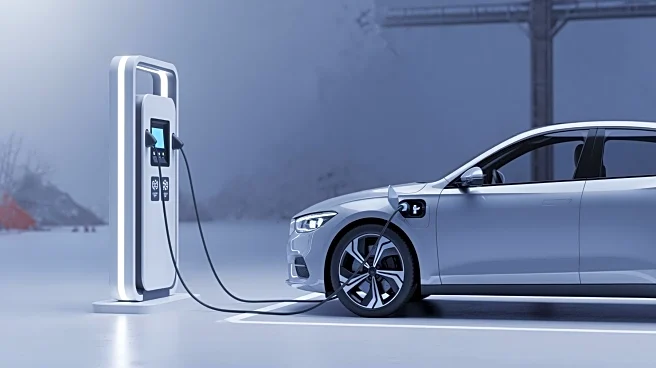What's Happening?
Ford's electric vehicle sales, including the Mustang Mach-E and F-150 Lightning, have shown resilience despite a general decline in the U.S. electric vehicle market following the end of the U.S. EV tax
credit. While sales figures for these models have decreased compared to October 2024 and September 2025, they have not experienced the dramatic drop seen by competitors like Hyundai and Kia. Specifically, the Mustang Mach-E recorded 2,906 sales, down from 3,313 in October 2024 and 7,643 in September 2025. The F-150 Lightning saw 1,543 sales, a decrease from 1,863 in October 2024 and 3,957 in September 2025. The E-Transit, however, experienced a significant drop with only 260 sales compared to 1,088 in October 2024. Despite these declines, Ford's electric models have maintained a relatively stable performance.
Why It's Important?
The performance of Ford's electric vehicles is significant as it highlights the company's ability to maintain a competitive edge in a challenging market environment. The resilience of the Mustang Mach-E and F-150 Lightning suggests that Ford's EV strategy may be more robust than some of its competitors, who have seen more severe sales declines. This stability is crucial for Ford as it navigates the transition to electric vehicles, a key area of growth and innovation in the automotive industry. The company's decision to decrease EV production capacity due to perceived dropping demand could impact its future market position. However, the relatively stable sales figures might encourage Ford to reconsider its production strategy and capitalize on the potential for recovery in the coming months.
What's Next?
Ford may need to reassess its production strategy in light of the stable sales figures for its electric models. The company could explore ways to boost demand and increase production capacity to meet potential future growth. Additionally, Ford's ability to maintain sales levels could influence its market strategy and investment in electric vehicle technology. Stakeholders, including investors and industry analysts, will likely monitor Ford's next moves closely to gauge the company's long-term commitment to the electric vehicle market and its ability to adapt to changing consumer preferences and market conditions.









